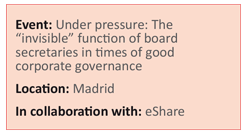Corporate structures often lack framework needed for effective compliance
Executives in parent companies often reluctant to accept board positions in foreign subsidiaries due to significant risks involved
Traditional corporate structures often fail to provide the necessary framework for adequate corporate compliance controls, attendees at a recent Iberian Lawyer event in Madrid heard. This is especially true in the case of companies with multiple subsidiaries abroad, as they are subject to a diverse range of regulatory requirements.
Participants in the event – which was held in conjunction with software provider eShare – were told that many multinationals traditionally assign board positions in sister companies to existing executives. The problem is that such executives often lack the time and local presence needed to ensure that nothing is amiss. Attendees heard that, instead, appointing local, independent board members to handle compliance issues in foreign subsidiaries can be a more efficient, professional and a less risky strategy – indeed, this is a requirement in certain jurisdictions. However, even in such scenarios, parent company executives must continue to play a key role in translating the company´s corporate governance values and addressing any cultural differences that may arise. That said, existing executives are often reluctant to accept board positions in foreign subsidiaries, as the increased responsibilities and associated personal costs and risks are very significant, participants were told.
Companies must ensure that there are appropriate remuneration and protection packages [for executives in board positions] and that they have the appropriate legal strategies in place to minimise any negative impact should problems emerge. Panellists agreed that law firms have a key role to play adapting existing compliance programs to local legislation, minimising risks and helping to implement good governance practices.













